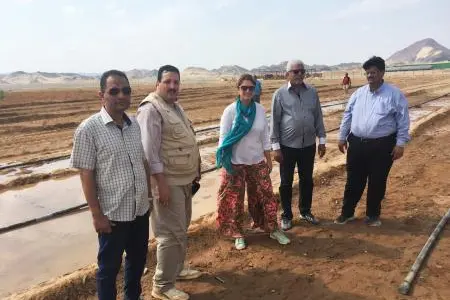PHOTO
The International Center for Biosaline Agriculture (ICBA) and HSBC Bank Middle East Limited have launched a new program to build sustainable networks and unleash the entrepreneurial potential of farming communities living in the marginal environments of Egypt and the UAE.
Dubbed “Food for the Future”, the program was officially presented at the Cairo Water Week in Egypt on 22 October 2019. The program seeks to promote sustainable and climate-resilient farming approaches to bring degraded lands back into use.
Moreover, the program aims to enable rural communities to prosper and ultimately drive rural economic development across the Middle East and North Africa (MENA) region.
The program is structured around three main themes: climate-smart agricultural entrepreneurship in Egypt; capacity development on integrated farming in the UAE; and unconventional sustainable farming approaches for salt-affected regions of Egypt. Under the program, farming communities, particularly farmworkers, will be educated through an interactive mobile application using video tutorials.
Supported by HSBC Bank Middle East Limited, as part of its corporate sustainability strategy, the program is designed to deliver cost-effective impacts at both local and regional levels and is implemented by ICBA and its partner institutions in Egypt and the UAE.
ICBA will work with the Egyptian Center of Excellence for Saline Agriculture and the Desert Research Center, Egypt, on quinoa production in the New Valley Governorate, and with the Ministry of Agriculture and Land Reclamation and the Red Sea Governorate on Salicornia production trials in the areas of Shalateen and Wadi El Quweh.
Commenting on the program, Dr. Ismahane Elouafi, Director General of ICBA, said: "We are delighted to launch the Food for Future program for farming communities in Egypt and the UAE. The program aims to introduce innovative approaches to ensure the sustainability of the farms and the farming communities with a focus on ‘green economy’ and ‘green entrepreneurship’."
"With our local partners and HSBC Bank, we will develop entrepreneurial capabilities of farming communities by introducing value chains for climate-smart crops such as quinoa and Salicornia. These best farming practices seek to provide the farming communities in both countries with approaches to sustainability; ecosystem services; as well as financial returns," added Dr. Ismahane Elouafi.
For his part, Mr. David Ramos, Senior Manager, Sustainability, HSBC Bank Middle East Limited, said: "Developing entrepreneurial skills and promoting sustainable supply chains are part of our corporate sustainability mandate. We do this through supporting initiatives that help companies and their supply chains grow sustainably. We have had a focus on food security and the agriculture supply chain for several years now, promoting integrated farming with Food for the Future Phase I and collaborating with the UAE Office of Food Security in the Agricultural Technology Accelerator in 2018, as part of the Access to Finance Working Group. Our partnership with ICBA strengthens this line of work, introducing an innovative approach that helps ensure the farmer's environmental and financial sustainability by bringing marginal environments into production and addressing the increasing need for farming land in the region."
As part of the program, ICBA will also work with the Dubai-based Smart Labour to provide interactive agriculture-related training to farmworkers in the UAE.
Smart Labour is an exclusive mobile application, mainly for blue-collar workers in the UAE, which provides smart education, bespoke software, and value-added services to make blue-collar workers happier, smarter, and more productive.
Smart Labour is supported by the Ministry of Human Resources and Emiratization, and the Mohammed Bin Rashid Innovation Fund. Smart Labour and ICBA are two of the global innovators selected for the EXPO LIVE program based in the UAE.
Mr. Abu Muadh, the founder of Smart Labour, said: "Smart Labour is delighted to partner with ICBA in providing useful education to farmworkers in the UAE. It will be the first time for farmers and farmworkers in the UAE to use a mobile app like Smart Labour to learn useful things and implement best practices related to farming. The partnership with ICBA is a perfect match to bring extensive expertise from ICBA scientists to farmers in a tailor-made way with the innovative use of technology."
The program is built on the success and impact of Phase I of the Food for the Future initiative. Over the coming years, the Food for the Future program is expected to develop, validate, and disseminate an innovative model of entrepreneurship and social leadership, taking full advantage of the opportunities emerging in the agricultural sector of the MENA region.
© Press Release 2019Disclaimer: The contents of this press release was provided from an external third party provider. This website is not responsible for, and does not control, such external content. This content is provided on an “as is” and “as available” basis and has not been edited in any way. Neither this website nor our affiliates guarantee the accuracy of or endorse the views or opinions expressed in this press release.
The press release is provided for informational purposes only. The content does not provide tax, legal or investment advice or opinion regarding the suitability, value or profitability of any particular security, portfolio or investment strategy. Neither this website nor our affiliates shall be liable for any errors or inaccuracies in the content, or for any actions taken by you in reliance thereon. You expressly agree that your use of the information within this article is at your sole risk.
To the fullest extent permitted by applicable law, this website, its parent company, its subsidiaries, its affiliates and the respective shareholders, directors, officers, employees, agents, advertisers, content providers and licensors will not be liable (jointly or severally) to you for any direct, indirect, consequential, special, incidental, punitive or exemplary damages, including without limitation, lost profits, lost savings and lost revenues, whether in negligence, tort, contract or any other theory of liability, even if the parties have been advised of the possibility or could have foreseen any such damages.




















